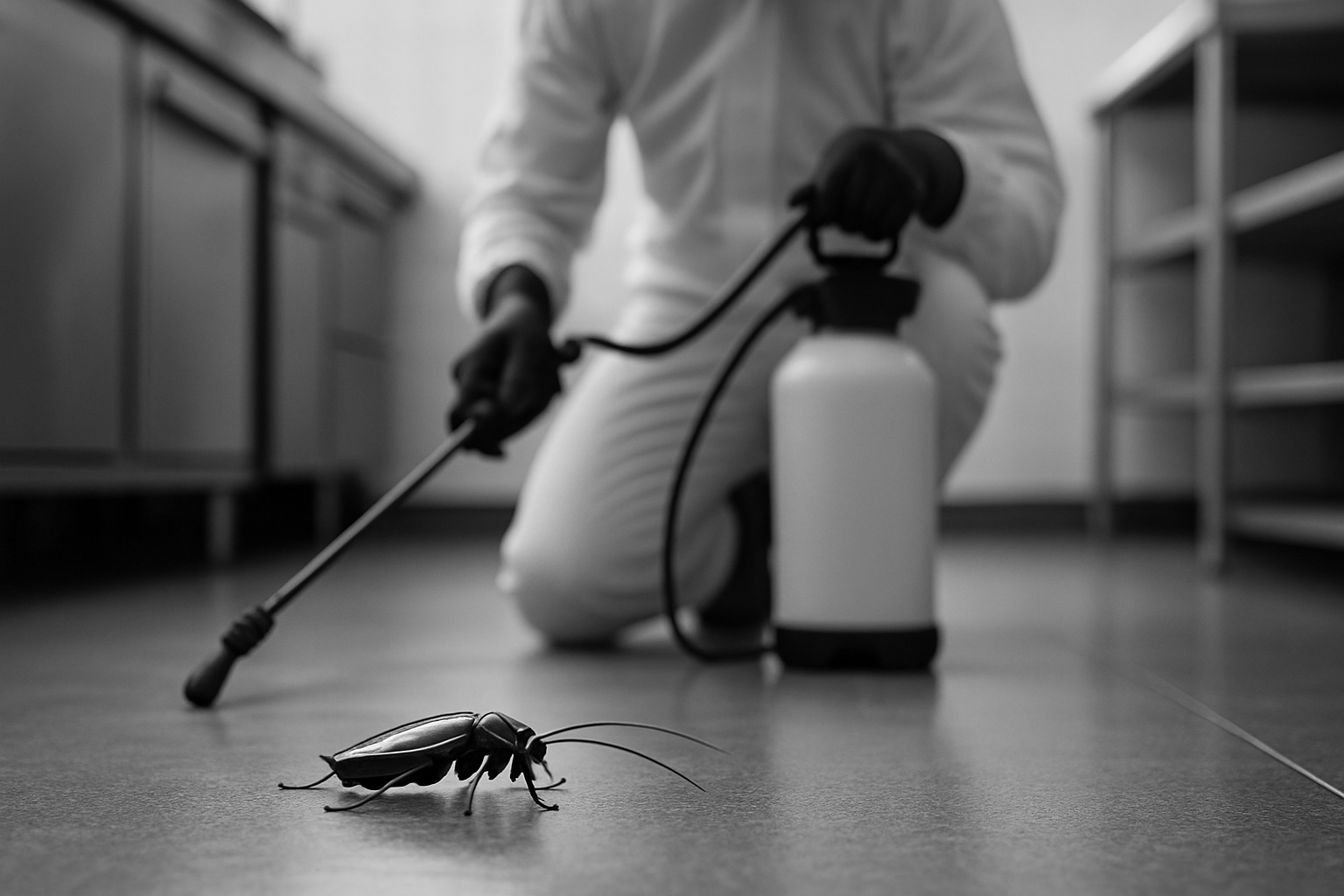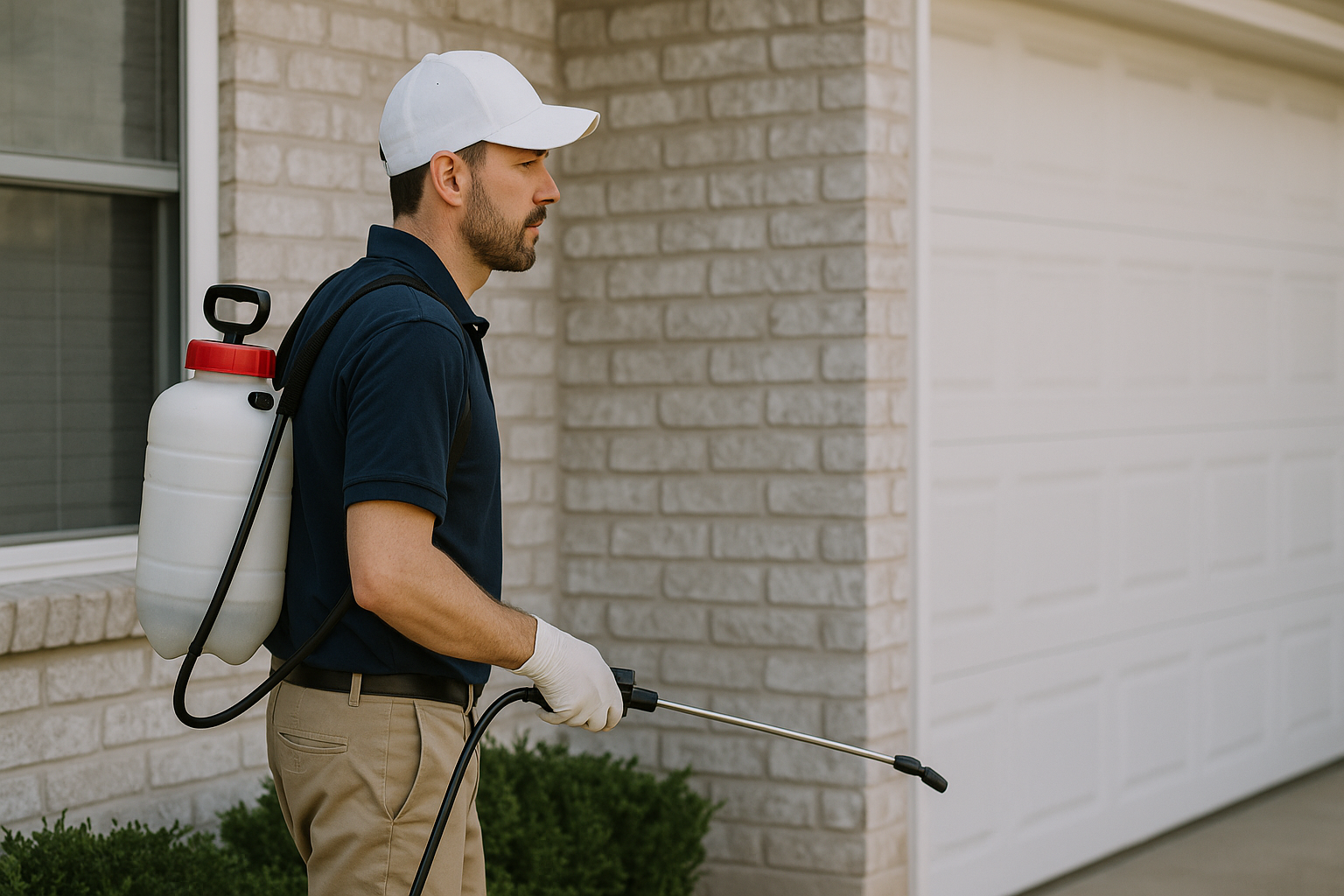Table of Contents
Importance of Comprehensive Cockroach Management
Maintaining a clean and pest-free environment in Dubai’s commercial settings—such as restaurants, hotels, office complexes, and retail outlets—is critical for operational success, reputation, and compliance. Cockroaches are among the most notorious pests because they threaten hygiene standards, spread contaminants, and can trigger allergies or respiratory problems.
Commercial cockroach infestations demand a focused approach balancing prevention, monitoring, and effective eradication. Given Dubai’s hot climate and bustling urban environment, these pests can multiply rapidly and infiltrate even the most well-maintained premises. Ignoring or underestimating the risks associated with cockroaches can result in regulatory penalties, customer loss, and impaired workplace safety.
Dubai Municipality’s Public Health Pest Control Section provides guidelines that emphasize strict pest control protocols to ensure food safety and public health—especially in hospitality, food processing, and healthcare sectors. Aligning your pest control strategy with these regulations is non-negotiable for Dubai businesses.
Key Components of Commercial Cockroach Control Services
Inspection and Identification
Accurate identification of cockroach species and infestation levels is the foundation of any control program. Expert technicians from professional services use specialized detection tools and environmental assessment to determine hotspots and entry points.
Tailored Treatment Plans
Effective commercial cockroach control combines chemical treatments, baiting, and environmental modifications. Tailored plans consider the unique layout and uses of the establishment, ensuring minimal disruption to operations and occupant safety.
Prevention and Sanitation Improvement
Beyond eradication, advising clients on hygiene practices and structural adjustments is essential. This includes sealing cracks, managing waste regularly, and reducing moisture sources, all of which reduce cockroach harborages.
Ongoing Monitoring and Maintenance
The pest control strategy must include ongoing monitoring with traps and scheduled inspections to catch reinfestations early. This proactive approach helps maintain pest-free status and supports documented control efforts.
Integrated Compliance Support
Top-tier commercial pest control services also guide clients through compliance requirements, assist in audit preparations, and document treatment interventions systematically.
Role of HACCP Logs, Audits, and Documentation
Businesses in Dubai’s food production and service industries are obligated to follow HACCP (Hazard Analysis and Critical Control Points) principles as part of their food safety management systems. Commercial cockroach control intersects directly with these requirements because pests represent critical hazards.
Maintaining meticulous HACCP logs for pest control activities helps organizations demonstrate due diligence during Dubai Municipality food safety inspections. These records typically include:
- Date and time of treatments or inspections
- Details on the type of control measures applied
- Results from cockroach monitoring traps or sightings
- Corrective actions and follow-up measures where applicable
- Technician credentials and service provider details
Reliable documentation also facilitates internal and third-party audits, enabling quick verification of compliance status and responsiveness to pest risks. This structured record-keeping is critical to passing Dubai’s strict food safety and hygiene audits while minimizing operational disruptions.
Service Level Agreements (SLA) and Response Time Expectations
One defining feature of professional commercial cockroach control providers in Dubai is their commitment to service level agreements (SLAs). These SLAs outline clear expectations for response times, treatment protocols, and reporting standards, providing clients with transparency and reliability.
Typical SLA components include:
- Guaranteed Response Time: Rapid response—often within 24 hours—is essential to contain and control infestations promptly.
- Regular Service Intervals: Scheduled treatments or inspections minimize the risk of recurrence.
- Emergency Call-Outs: Flexibility for urgent interventions beyond planned visits.
- Comprehensive Reporting: Submission of detailed service reports and documentation for client records and audits.
Dubai businesses depend on such SLAs to maintain pest control integrity aligned with operational demands, regulatory requirements, and brand reputation.
Case Study: Effective Commercial Cockroach Control in Dubai
Consider a prominent restaurant chain in Downtown Dubai that faced recurring cockroach complaints impacting customer satisfaction and inspection results. They engaged a dedicated pest control partner specializing in commercial cockroach control with expertise in Dubai’s regulatory environment and HACCP compliance.
The service provider executed a comprehensive assessment identifying infestation zones in kitchen storage and waste disposal areas. They implemented a customized treatment plan incorporating targeted baiting, sealing entry paths, and staff training on sanitation best practices.
Over six months, the restaurant maintained precise HACCP logs documenting pest control activities, which helped during Dubai Municipality audits. The pest control partnership adhered to strict SLA terms, providing rapid intervention whenever sporadic sightings occurred.
As a result, the restaurant reported a substantial drop in cockroach activity and passed regulatory inspections without pest-related findings. This success enhanced customer trust and safeguarded their market position in Dubai’s competitive hospitality sector.
For businesses interested in professional-grade pest management services that meet Dubai standards and best practices, learn more about solutions at Saniex’s service offerings specialized in commercial environments.
Conclusion and Call to Action
Commercial cockroach control in Dubai demands a strategic, compliant, and proactive approach to safeguard business operations and reputation. Emphasizing service quality through detailed HACCP documentation, adherence to SLAs, and rapid response times ensures effective management of pest risks.
Businesses operating in Dubai’s dynamic commercial landscape should partner with trusted pest control experts who understand local regulatory frameworks and environmental factors. For comprehensive guidance and tailored pest solutions aligned with Dubai Municipality standards, consider visiting the Dubai Municipality Public Health Pest Control Section.
Take the first step toward a pest-free workplace by consulting specialized providers like Saniex, who combine industry knowledge with Dubai-specific expertise to deliver reliable commercial cockroach control.
Advanced Strategies for Effective Commercial Cockroach Control in Dubai
In Dubai’s fast-paced commercial environment, maintaining a pest-free business space is not only crucial for hygiene but also vital for compliance with Dubai Municipality’s stringent health regulations. Commercial cockroach control remains a persistent challenge for many establishments, from restaurants in Dubai Marina to offices in Business Bay and warehouses in Jebel Ali. Considering that cockroaches are known carriers of harmful pathogens and allergens, effective management strategies must be tailored specifically for the commercial setting to ensure both safety and operational continuity.
Successful Commercial Cockroach Control in Dubai requires a multifaceted approach that combines thorough inspection, expert intervention, and ongoing preventive measures. This section explores advanced strategies beyond routine pest treatment that businesses can implement to protect their premises from cockroach infestations and to meet the Dubai Health Authority’s (DHA) and Dubai Municipality’s regulations.
Comprehensive Inspection and Risk Assessment
Accurate identification of cockroach activity zones and understanding risk factors are essential first steps. Commercial areas, particularly food-related businesses such as cafes in Downtown Dubai or catering companies in Nad Al Sheba, often encounter cockroach problems due to waste accumulation, moisture, and clutter—conditions that attract and sustain infestations.
- Site Mapping: Professional pest control operators conduct detailed inspections to map cockroach hotspots, tracking entry points such as drains, ventilation ducts, and external waste disposal areas.
- Environmental Assessment: Moisture control and sanitation audits assess factors contributing to infestations. In Dubai’s humid coastal climate, condensation areas and leaky pipes are common breeding grounds.
- Compliance Check: Businesses must verify that their sanitation and waste management processes meet Dubai Municipality’s Pest Control Guidelines and Food Safety Standards to reduce infestation risk.
Through this thorough diagnosis, you gain precise insights into infestation severity and can tailor treatment plans that minimize chemical use while maximizing effectiveness.
Integrated Pest Management (IPM) Tailored for Commercial Properties
Dubai’s environmental policies promote sustainable practices, making Integrated Pest Management (IPM) not only an effective solution but also a responsible approach to commercial cockroach control. IPM employs a combination of biological, mechanical, and chemical methods, emphasizing prevention alongside treatment.
Key components of IPM applied in Dubai commercial settings include:
- Sanitation and Physical Barriers: Rigorous cleaning schedules, proper food storage, and sealing of cracks and crevices to deny cockroaches access and breeding sites.
- Monitoring: Use of low-toxicity bait stations and sticky traps that allow early detection of cockroach presence without widespread spraying, helping businesses track pest activity in real-time.
- Targeted Chemical Application: Where necessary, Dubai-approved pesticides compliant with ESMA and MOHAP standards are applied in precise, minimal amounts to reduce environmental impact.
- Education and Training: Staff training programs familiarize employees with best practices for sanitation and recognizing pest activity, fostering a pest-aware culture critical for long-term control.
By integrating these components, businesses can greatly reduce reliance on frequent chemical treatments, align with Dubai Municipality’s mandate for safer pest control practices, and maintain continuous protection against cockroach intrusions.
Special Considerations for High-Risk Commercial Sectors
Different industries in Dubai face unique challenges when it comes to cockroach control. Understanding these nuances helps customize solutions that meet specific operational and regulatory needs.
Food and Beverage Industry
Restaurants and cafes in Dubai Marina and Downtown Dubai are particularly vulnerable due to constant food handling and waste generation. Dubai Health Authority’s Food Safety Division enforces strict requirements for pest management, necessitating:
- Routine monitoring and documentation of pest control activities.
- Use of only approved pest control contractors with valid Dubai Municipality certification.
- Immediate corrective action upon detection of any pest activity to avoid closure or penalties.
Effective cockroach control in such environments includes sealing entry points, maintaining dry and clean kitchen floors, and scheduling pest control treatments during non-operational hours to minimize disruption.
Warehouses and Storage Facilities
Storage areas in industrial zones such as Jebel Ali Free Zone (JAFZA) often face cockroach infestations arising from packaging materials, spilled liquids, and improper waste handling. Because cockroaches severely affect stored goods quality and can cause reputational damage, major logistics companies in Dubai employ:
- Regular deep cleaning regimes focused on high-risk areas like loading docks and storage racks.
- Installation of smart pest monitoring solutions with alert systems to trigger prompt intervention.
- Collaboration with licensed pest control providers offering customized action plans aligned with Dubai’s environmental safety codes.
Ongoing Maintenance and Documentation for Compliance
One of the pillars of sustained Commercial Cockroach Control is structured maintenance paired with meticulous record-keeping. Dubai authorities require businesses, especially food handlers and healthcare facilities, to maintain logs of pest control activities, inspections, and corrective measures. This documentation supports compliance during routine inspections carried out by Dubai Municipality and DHA officers.
Essential maintenance practices include:
- Weekly inspections of vulnerable areas to detect early signs of cockroach presence.
- Immediate sanitation responses to spills, debris, or water leaks discovered during daily operations.
- Regular review and adjustment of pest management strategies with licensed providers to adapt to seasonal and operational changes.
With ongoing maintenance, businesses in Dubai can secure their reputation, protect customers and employees, and stay ahead of regulatory requirements.
Why Choose Licensed, Local Pest Control Experts Like Saniex?
Engaging locally licensed experts like Saniex in Dubai ensures your commercial property benefits from pest control services that adhere strictly to Dubai Municipality standards and use ESMA-compliant products. Saniex’s specialized knowledge of Dubai’s environmental conditions, commercial regulations, and building types enables precision in tackling cockroach infestations without impacting business productivity.
Moreover, local companies such as Saniex provide rapid response times tailored to Dubai business hours and offer customized Integrated Pest Management plans that prioritize safety, environmental responsibility, and long-term effectiveness.
In conclusion, commercial cockroach control in Dubai demands a strategic, regulated, and holistic approach combining inspection, customized treatment, preventive maintenance, and compliance with local authorities. By adopting these advanced methods, businesses can confidently safeguard their premises and meet Dubai’s high standards for hygiene and safety.





